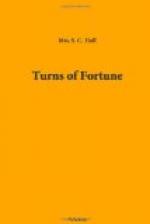“God bless you, Rose!” exclaimed the trembling voice of the discarded lover, who, pale and wo-worn, had been unintentionally concealed among the trees—“God bless you, Rose!—that prayer has done me good. Amen to every word of it! She is quite, quite gone now—another’s bride—the wife of a gentleman—and so best; the ambition which fits her for her present station unfitted her to be my wife. I say this, and think this—I know it! But though I do know it, her face—that face I loved from infancy, until it became a sin for me to love it longer—that face comes between me and reason, and its brightness destroys all that reason taught.”
Rose could not trust herself to reply. She longed to speak to him, but she could not; she dared not. He continued—“Did she leave no message, speak no word, say nothing, to be said to me?”
“She said,” replied her cousin, “that she hoped you would be happy; that you deserved to be so”—
“Deserved to be so!” he repeated bitterly; “and that was the reason why she made me miserable. Oh! the folly, the madness of the man who trusts to woman’s love—to woman’s faith! But the spell once broken, the charm once dispelled, that is enough!” And yet it was not enough, for Edward talked on, and more than once was interrupted by Rose, who, whenever she could vindicate her cousin, did so bravely and generously—not in a half-consenting, frigid manner, but as a true woman does when she defends a woman, as, if she be either good or wise, she will always do.
Rose did not know enough of human nature to understand that the more Edward complained of Helen’s conduct and desertion, the less he really felt it; and the generous portion of his own nature sympathised with the very generosity which he argued against. He had found one, who while she listened sweetly and patiently to his complaints, vindicated, precisely as he would have desired, the idol of his heart’s first love. What we love appears so entirely our own, that we question the right of others to blame it, whatever we may do ourselves. If he had known the deep, the treasured secret that poor Rose concealed within the sanctuary of her bosom, he would have wondered at the unostentatious generosity of her pure and simple nature.
“It is evident,” said Rose Dillon to herself, when she bade Edward adieu; “it is quite evident he never will or can love another. Such affection is everlasting.” How blind she was! “Poor fellow! he will either die in the flower of his age of a broken heart, or drag on a miserable existence! And if he does,” questioned the maiden, “and if he does, what is that to me?” She did not, for a moment or two, trust herself to frame an answer, though the tell-tale blood, first mounting to and then receding from her cheek, replied; but then she began to calculate how long she had known Edward, and thought how very natural it was she should feel interested, deeply interested, in him. He had no sister; why should she not be to him a sister? Ah, Rose, Rose! that sisterly reasoning is of all others the most perilous.




